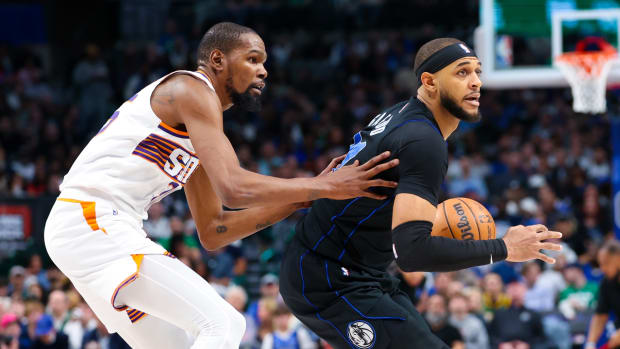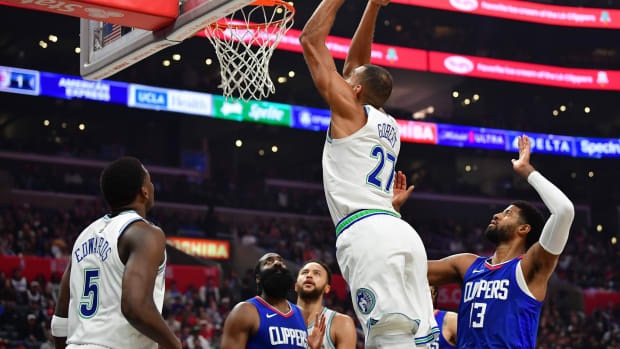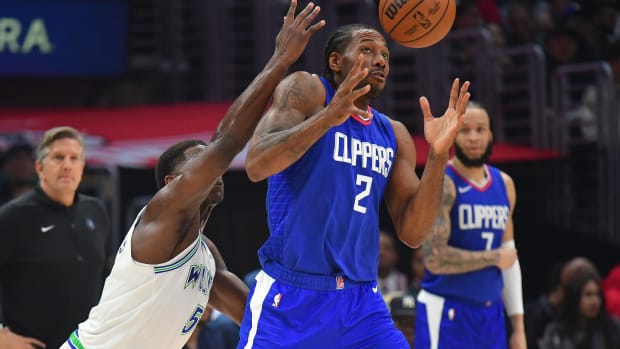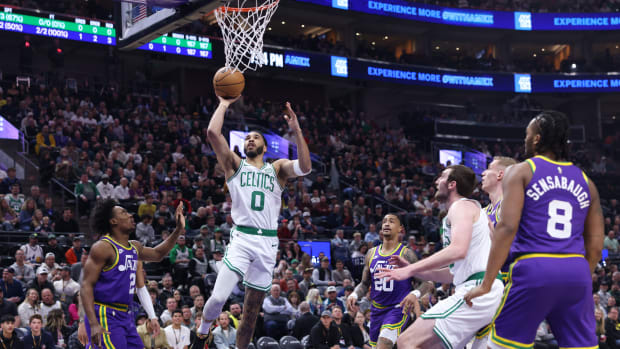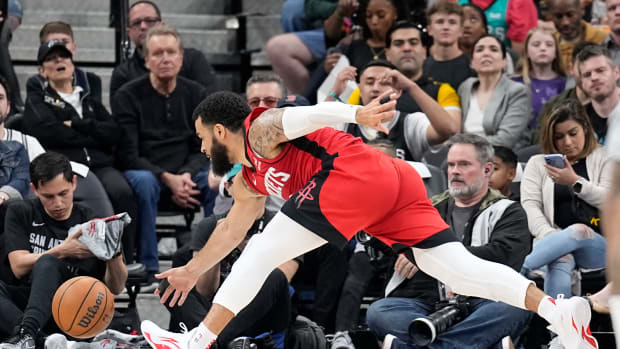CJ McCollum’s Steady Presence Amid ‘Choppy’ Pelicans Season
CJ McCollum, 31 years old and a decade into his NBA career, is trying his best to be the calm amid the chaos. To be the voice of wisdom. To teach the fundamentals. But, well, kids can be stubborn. At the moment, McCollum can’t even get through this phone conversation without a little wailing.
“Take your milk,” McCollum says softly, his voice rising a half-octave. “Drink your milk.”
Jacobi James McCollum (age 1) at last accepts the coaching, freeing Dad to resume his reflections on leadership, team building, winemaking, union leading and fatherhood—and the immense challenge of doing it all simultaneously while also navigating a new team, a new city and new expectations after his trade from Portland to New Orleans last February. All of which followed a serious health scare—a collapsed lung in December 2021.
“It’s been the most complex year of my life,” McCollum says. “It’s been a lot of character building, a lot of learning, a lot of trial and error, and a lot of meditation, therapy sessions with my therapist. And a lot of just heart-to-hearts with my family, with my wife, just trying to figure out next steps and what we want to accomplish in this life.”
And the basketball? Well, that’s been a roller coaster ride. On the day of this conversation, the injury-wracked Pelicans are mired in a losing streak that will soon reach seven games, their roughest stretch of the season. Brandon Ingram, their brilliant young All-Star, is about to return—with considerable rust—from a two-month absence. Zion Williamson, their thermonuclear scoring machine, has been on the sidelines since Jan. 2 because of a hamstring injury.
A Pelicans team that spent most of December in first or second place in the West has slipped to fifth, its rotation patched together with youth and journeymen. And McCollum, who was acquired to be the Pels’ fulcrum—the savvy playmaker who could keep the stars in rhythm and the offense humming—has been thrust, out of necessity, into a primary scoring role.
McCollum’s usage rate in January shot past 30%, up from 27% in December (when he still had Williamson) and 25% in November (when the Pels were at full strength).
“It’s definitely been tough,” McCollum says. “It’s been a unique challenge. And I’ve had conversations with [coach Willie Green] about it. And obviously there’s a different type of load, a different type of usage, when BI and Zion are playing.”

McCollum is averaging a career-high 5.8 assists per game this season while taking on more playmaking responsibilities than expected.
Rick Osentoski/USA TODAY Sports
Despite everything, McCollum has produced at a rate that reasonably puts him in the conversation for an All-Star reserve spot. (Coaches ballots are due Monday.) As of Sunday morning, he was one of 11 players averaging at least 21 points, 4.5 rebounds and 5.5 assists—and one of just four in that group with a three-point percentage over .380. Had the Pelicans stayed healthy, and in the top two in the West, McCollum’s All-Star case would surely be stronger. As it stands, he might have a tough time emerging from a deep field of guards that includes Ja Morant, Shai Gilgeous-Alexander, De’Aaron Fox, Anthony Edwards and, of course, his old running mate Damian Lillard.
Cue David Byrne murmuring, “Same as it ever was.” McCollum spent his first nine seasons in Lillard’s shadow, often posting star-caliber box scores that went overlooked, while perennially being blockaded at the ballot box by a roster of future Hall of Famers: Stephen Curry, James Harden, Russell Westbrook, Chris Paul, Klay Thompson.
“It’s an honor to even be mentioned in these conversations,” McCollum says. “I’m just thankful to be able to go compete, man, whether that’s first option, second option, third option. I just love to compete. … I would say that I’ve consistently delivered, in terms of trying to help impact winning. And I think a lot of coaches or teams around the league are seeing that.”
Anyway, McCollum long ago grew accustomed to living on the periphery—as a lightly recruited high-school star who went on to play four years at Lehigh, and 10 years in two of the NBA’s smaller markets. And at this stage of his career, it’s the winning that matters most, which is why McCollum was thrilled to land in New Orleans nearly 12 months ago, and happy to sign a contract extension there last fall.
The Pelicans promptly revived their season after McCollum’s arrival, making a surprising run from play-in tournament to playoff team, and putting a scare into the top-seeded Suns in the first round. They took another leap early this season, vaulting into the top 10 in both offensive and defensive efficiency before injuries—to Ingram, Williamson and defensive ace Herb Jones—began to take their toll.
With Ingram and Jones back, and Williamson on the mend, the Pelicans fully expect to replicate those results over the season’s final 10 weeks. All McCollum has to do is strike the right scoring and playmaking balance with his two precocious co-stars, impart as much wisdom as he can to this young roster and coax enough sound play to make the Pelicans a true force this spring.
“I learned a lot from playing alongside Dame,” he says. “I think the leadership style, my approach there, was different than what it has to be here, because of the fact that this is a younger team. The fact that I’m playing more on the ball. I probably have the most playoff experience on this roster. … So I think what is being asked of me is different. It’s a unique challenge that I’m embracing, I’m accepting and I’m happy to be a part of. And it’s a journey, right? Like, I haven’t mastered it. But I think I’ve displayed the fact that I can lead in different ways.”
All of which is what Pelicans officials had in mind when they sent a package of players and draft picks to Portland for McCollum last Feb. 8. New Orleans was flush with talent, albeit mostly young and unproven. But the roster needed an infusion of wisdom and playoff experience, and a steady hand at point guard, a position of need after the Pels parted ways with Lonzo Ball and Jrue Holiday in recent years.
“He’s actually been exactly what we thought he was,” David Griffin, the Pelicans’ executive vice president, says of McCollum. “He has a really good feel of who he is, what his game is. I think it’s been an adjustment for him, in terms of figuring out how much to keep the ball, how quickly to get off the ball.”
McCollum was used to splitting ball-handling and scoring duties from his years with Lillard. The early partnership with Ingram came almost naturally. But Williamson’s return this season presented another dimension and another challenge, albeit a welcome one, with three ball-dominant stars trying to blend their talents. That dynamic remains a work in progress, because of the injuries and the constant changes to the lineup.
“Our season has been so choppy,” Griffin says. “I think it's been harder for [McCollum] to pick his spots. And he’s just such a consummate teammate. He’s always searching for where he can be useful and how he can help. And sometimes I think he gives himself paralysis by analysis. And when he’s playing well—and he’s played unbelievably well in the absence of the other two guys—he’s just playing and making reads and a little freer.”

McCollum has seamlessly adjusted to his role as the Pelicans’ veteran leader while playing nearly as many games as Zion Williamson and Brandon Ingram combined.
Bill Streicher/USA TODAY Sports
Griffin had pursued McCollum for years, but the Blazers under general manager Neil Olshey had consistently rebuffed all trade inquiries. That stance changed after Joe Cronin replaced Olshey in December 2021.
“It’s very rare when a player is available that checks every box you’re looking to check,” Griffin says. “CJ was that. His human component very much was in line with what we had built.”
It’s been five years since this franchise finished with a winning record (behind Anthony Davis), and 15 years since the team (then known as the Hornets) broke the 50-win plateau (behind Chris Paul). This group has a chance to exceed all of that—and with a little luck, a shot at going where no New Orleans team has gone before: the conference finals. In a year with no clear favorite in the West, it’s not hard to imagine.
“I like to keep my expectations internal,” Green says. “I have a vision of what I believe we can be. We just haven’t been healthy enough for it to happen. … I think sky’s the limit if we do.”
It will require some expert navigation along the way, a delicate massaging of egos and expectations and roles, much of which will fall to the second-year head coach and his veteran point guard, whose playing careers actually overlapped for two years.
If McCollum seems undaunted by the challenge, it’s because he’s already been through so much in the last 18 months.
He was elected president of the players association in August 2021, just as the NBA and the union began preparing for a new round of collective bargaining. The next month, he bought a winery in Oregon. Three months later, in a loss to the Celtics, McCollum suffered a rib injury that caused a collapsed lung, sidelining him for six weeks. Jacobi James came along on Jan. 10, while his dad was still home recovering. McCollum returned to the Blazers lineup the next week—and was traded three weeks after that, leaving for New Orleans right after his son’s four-week checkup. It wasn’t until last summer that CJ and his wife Elise could go home shopping together in their new city. Oh, and he also signed on as a part-time analyst for ESPN, while continuing his independent weekly podcast. He even found time to write an op-ed piece about criminal justice reform for the Times-Picayune.
It’s exhausting just to type all of that, much less live it. (Thus, the “most complex year” of his life, as McCollum says.)
“I would say that I’m very busy,” McCollum says. “My days are very calculated. Obviously, basketball comes first. I do my best to dedicate time to the things that I care about and the things that are important to me. … Learning how to be a father, to be a husband, in a new city, learning how to transition. Learning how to run businesses, learning how to negotiate on behalf of players, I think it’s all a part of growth. It’s all a part of a unique challenge.”
He adds, “I think this is the most peace and solace that I’ve had in my life, because I have a purpose. I have an understanding of who I am. I think this is the most grounded and sound and comfortable I’ve ever been.”
It’s all going pretty well. The McCollum Heritage 91 pinot noir got rave reviews from the Wall Street Journal, and is popular among McCollum’s vinophile teammates. (Providing the occasional case for team dinners surely helps team chemistry.) Labor talks with the league seem to be progressing peacefully. And the Pelicans are getting healthy in time for a second-half resurgence.
“It’s a really good test for guys that are healthy right now, that are playing, the mental anguish of, Oh, we almost had it. That’s a game we should have won,” McCollum says. “It’ll all help us down the road. We’ll be healthy at some point. We’ll be able to go on more winning streaks and really build a rapport and a chemistry that will take us to the next level.”
McCollum has switched to speakerphone now, freeing his hands to change a diaper while breaking down the Pelicans’ hopes for the season. Jacobi is almost walking on his own, which means he’ll soon be ready to lob shots at the Fisher-Price basket with Dad. One more young protégé who needs a little schooling in the fundamentals.
“Nothing better than this, man,” McCollum says before hanging up. “Best thing in the world.”































